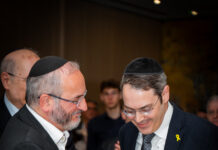If I were to ask you, “What is the wealthiest place in the universe?”, what would you answer? You might suggest the banks, the diamond mines, or something along these lines. But in a sense, the wealthiest place in the world is the graveyard. Why?
There, you’ll find dreams never chased after, ideas and inspiration never acted upon, music never composed, works of art never created, books never written, companies and organizations never built; endless potential, never actualized. And on our deathbed, these dreams, these ideas, they’ll come to us and say: “We came to you, and only you could have given us life, but you didn’t; and now, we die with you.
If we died today, what unrealized potential would die with us? What dreams, contributions, and creativity would remain unexpressed? What would we be taking with us to the grave?
Most people we know will probably say: “I’ll do it tomorrow”. But there’s no guarantee we will be here tomorrow. This is why the Mishna in Avos tells us to do teshuva (repent) the day before we die. The Gemara explains this to mean that a person should always be in a process of teshuva, because one never knows which day will be his last. So, if we died today, what dreams, ideas, and potential would die with us?
Our Role Models
There are, however, a few rare individuals out there who do act on their dreams and inspiration, who truly live lives of greatness. They maximize their time and actualize as much of their potential as possible. These rare individuals shine a light into this world and serve as an inspiration to all those who are fortunate enough to know them. Their existence alone inspires those around them to become more, to want more, to demand more from themselves, to raise their standards.
Fascinatingly, many of these unique people have undergone tremendous challenge. They’ve been thrown down, torn apart, and pushed to the brink. And yet, they rose up, stronger than ever before, driven to greatness, serving as an inspiration to others. This begs the obvious question: did they become great despite their challenges, or because of them? What is the secret to their success?
Yaakov’s Greatness
The Avos all seem to have trouble-ridden journeys. Yaakov, for example, seems to be plagued with challenge after challenge, beginning from his very birth. His battle with Esav regarding the bechora ends with Yaakov running for his life; he then has to deal with Lavan’s trickery; when he finally returns to Eretz Yisrael, he is confronted with the unfortunate events of Dinah and Shechem. If that wasn’t enough, his favored son, Yosef, is now torn away from him. Yaakov is tormented with hardship after hardship, and yet, despite all these challenges, he still achieves absolute greatness. This leads us to our question: What is the spiritual purpose of a nisayon (test/challenge)?
There are several potential purposes for a challenge or test. A test is usually administered to evaluate a person’s knowledge or mastery of a given area. However, this cannot be the case in a test given by Hashem, as Hashem is all-knowing and therefore fully aware of exactly how much we are capable of. What, then, is the purpose of a test? Why does Hashem constantly send us challenges and tests?
The Multifaceted Purposes of a Challenge
1: Contrast and Appreciation
On the most basic level, we often only appreciate things once we have lost them. One generally does not appreciate the importance of their hand in their daily routine until they break it, or how much they love someone until they’ve lost them. The Maharal and Ramchal explain that human beings learn through comparison and contrast. We understand the concept of wisdom by witnessing foolishness, goodness from witnessing evil, and wealth by witnessing poverty. The same goes for our health and quality of life. Only by experiencing the worst of times can we truly appreciate the best of times.
2: Kaparah
On a slightly deeper level, Hashem may send us challenges in order to be mechaper (atone) for our past wrongdoings. Instead of receiving all of our atonement in the World to Come, which would be far more severe, Hashem sends us yesurin (hardship) in this world.
3: Wake-Up Call
The Ramchal explains that Hashem sometimes sends us a challenge in order to “wake us up”, to help us get back on the proper track. There may be times when we find ourselves on the wrong path, drowning in the physicality of life. In such circumstances, Hashem may choose to jolt us awake, motivating us to question our choices and direction in life. These challenges should push us to realign our values, to regain our desire to live with higher ideals. The Gemara says that if something negative happens to us, our first reaction should be to examine our deeds and try to determine what character trait we can work on. Sometimes, a challenge is the perfect way to jolt us out of our stupor, leading us to reassess our lives, reconnect with Hashem, and commit to living a more spiritual, purposeful life.
The Deeper Purpose of a Challenge
There is a fundamentally deeper understanding of a challenge, one that reveals the very core spiritual purpose and effect of a test. In order to understand this deep level, we must examine the life of Avraham Avinu and the ten challenges he overcame. The Mishna in Avos tells us that Avraham was subjected to ten tests and overcame them all, expressing his eternal dedication to Hashem. The commentators question the necessity for Avraham to undergo all these hardships. They question as follows: If Hashem already knew whether Avraham could pass these tests, why even conduct them?
The Ramban explains that the purpose of a challenge is to push you to actualize your latent potential, to transform your koach (potential) into po’al (actual). Hashem already knows exactly who you are and what you can become; the purpose of an ordeal is to enable you to realize who you can become so that you can then actualize that potential. Each challenge that Avraham and the rest of the Avos overcame was another step in their journey towards perfection.
The Rambam explains that this is why the word for challenge, nisayon, is based on the word for banner- nes. A group raises a banner or flag to express who they are and what they stand for. When we overcome challenges and achieve greatness, our perseverance and triumph serves as a banner for all to see and learn from.
In order to better understand this concept, consider the following analogy: There was a man who was training to compete in the high-jump at the Olympics. He practiced every day, gaining strength and improving as he went. The first week, he was able to jump the three-foot fence. The next week, he made it over the four-foot fence. After two more weeks, he was able to jump over the five-foot fence. But no matter how hard he trained, he just couldn’t clear the six-foot fence. After working on it for another five weeks, he began losing hope. One day, as he was about to head home, he saw a bull stampeding, full speed, straight at him. Seized by adrenaline, he flew right over the six-foot fence – the same fence that, just moments before, he was convinced he was unable to jump over. So, here’s the question: was he capable of jumping over the fence until now? If not, what changed?
The answer is profound: for quite some time, he had been capable of jumping over the fence. But sometimes, we need external pressure to help us fully harness our potential. We have all heard the stories of a mother lifting a car to save her child; in any other scenario, this same mother wouldn’t even be able to move the car an inch. Our challenges bring out strength buried deep within us, helping us actualize our latent potential that would have otherwise remained hidden.
Rabbi Shmuel Reichman is the author of the bestselling book, “The Journey to Your Ultimate Self,” which serves as an inspiring gateway into deeper Jewish thought. He is an educator and speaker who has lectured internationally on topics of Torah thought, Jewish medical ethics, psychology, and leadership. He is also the founder and CEO of Self-Mastery Academy, the transformative online self-development course based on the principles of high-performance psychology and Torah.
After obtaining his BA from Yeshiva University, he received Semicha from Yeshiva University’s RIETS, a master’s degree in education from Azrieli Graduate School, and a master’s degree in Jewish Thought from Bernard Revel Graduate School. He then spent a year studying at Harvard as an Ivy Plus Scholar. He currently lives in Chicago with his wife and son where he is pursuing a PhD at the University of Chicago.
To invite Rabbi Reichman to speak in your community or to enjoy more of his deep and inspiring content, visit his website: ShmuelReichman.com









